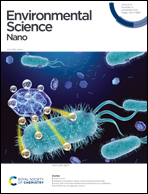Nano zero-valent iron harms methanogenic archaea by interfering with energy conservation and methanogenesis
Abstract
Iron-based nanoparticles (Fe-NPs), often applied for pollutant remediation, inevitably interact with various organisms either directly or indirectly. The well-acknowledged toxicological mechanisms for Fe-NPs on organisms are causing oxidative damage and disrupting membrane integrity. In this study, we focused on the interaction between Fe-NPs and methanogenic archaea, a common combination used in anaerobic digestion. We selected three forms of Fe-NPs, nanoscale zero-valent iron (nZVI), sulphide-nZVI (SnZVI) and nanoscale FeS (nFeS). We demonstrated that although all three Fe-NPs caused oxidative stress and disruption of the cell surface for Methanosarcina acetivorans, a model acetotrophic methanogen, only nZVI and SnZVI inhibited the growth and methane production. nFeS that contains Fe2+ did not show any inhibitory effect, indicating that the inhibition of growth and methane production by nZVI and SnZVI on M. acetivorans is not due to those factors. We then discovered that the growth of M. acetivorans facilitated the oxidation and dissolution of nZVI and SnZVI, generating H2 and soluble Fe2+, a process that undermined energy conservation and methanogenesis by occupying the energetic H+ gradient generated from the membrane-bound electron transport chain. Our results reveal a previously undetected harmful mechanism of nZVI on methanogenic archaea, which advances a deeper understanding of potential negative effects of applying nZVI as an engineered nanoscale material in anaerobic digestion.



 Please wait while we load your content...
Please wait while we load your content...